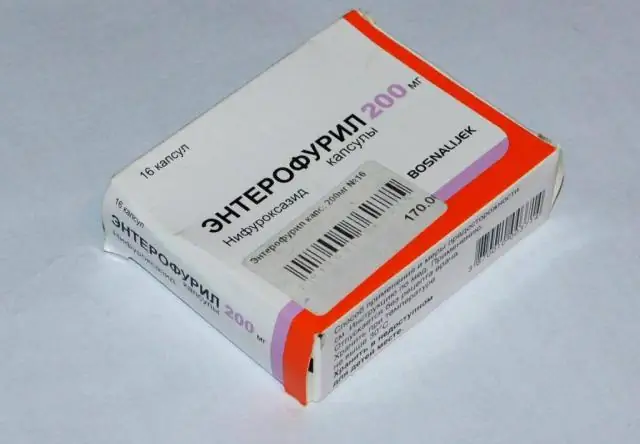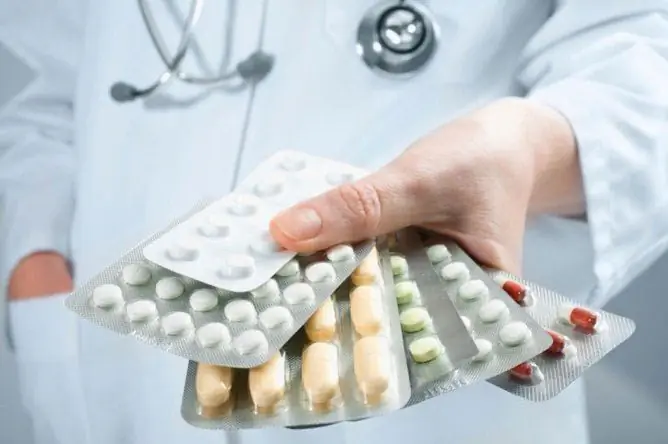- Author Rachel Wainwright wainwright@abchealthonline.com.
- Public 2023-12-15 07:39.
- Last modified 2025-11-02 20:14.
Ibuprofen Medisorb
Ibuprofen Medisorb: instructions for use and reviews
- 1. Release form and composition
- 2. Pharmacological properties
- 3. Indications for use
- 4. Contraindications
- 5. Method of application and dosage
- 6. Side effects
- 7. Overdose
- 8. Special instructions
- 9. Application during pregnancy and lactation
- 10. Use in childhood
- 11. In case of impaired renal function
- 12. For violations of liver function
- 13. Use in the elderly
- 14. Drug interactions
- 15. Analogs
- 16. Terms and conditions of storage
- 17. Terms of dispensing from pharmacies
- 18. Reviews
- 19. Price in pharmacies
Latin name: Ibuprofen Medisorb
ATX code: M01AE01
Active ingredient: ibuprofen (Ibuprofen)
Manufacturer: JSC "Medisorb" (Russia)
Description and photo update: 2020-23-07

Ibuprofen Medisorb is a non-steroidal anti-inflammatory drug (NSAID) that has antipyretic, anti-inflammatory and fast targeted analgesic effects.
Release form and composition
The drug is produced in the form of capsules: size No. 1, gelatinous, solid, white body and green lid, the contents of the capsules are white or white powder with a yellow tint (7, 10 or 14 pcs. In blisters, in a cardboard box 1, 2, 3, 4, 5 or 10 packs, 20, 30, 50 or 100 pieces in polymer cans, in a cardboard box of 1 can. Each pack also contains instructions for the use of Ibuprofen Medisorb).
1 capsule contains:
- active substance: ibuprofen - 200 mg;
- auxiliary components: croscarmellose sodium, aerosil (colloidal silicon dioxide), magnesium stearate, talc;
- capsule shell: gelatin, yellow iron oxide, titanium dioxide, indigo carmine.
Pharmacological properties
Pharmacodynamics
Ibuprofen Medisorb is an NSAID that has analgesic, antipyretic and anti-inflammatory effects. Its active ingredient is ibuprofen, which is a propionic acid derivative. The mechanism of action of the drug is due to the ability of ibuprofen to indiscriminately block COX-1 (cyclooxygenase-1) and COX-2 (cyclooxygenase-2), as a result of which the synthesis of mediators of inflammation, pain and hyperthermic reaction, prostaglandins, is inhibited (slowed down).
Along with a fast directed action against pain and antipyretic action, NSAIDs reversibly inhibit platelet aggregation.
Pharmacokinetics
After taking the capsule inside, the active substance is rapidly and almost completely absorbed from the gastrointestinal tract (GIT). The maximum concentration (C max) of ibuprofen in the blood plasma is reached after 30-40 minutes. Simultaneous food intake can increase the time to reach C max. After taking Ibuprofen Medisorb on an empty stomach at a dose of 400 mg (2 capsules), the presence of ibuprofen in the blood plasma is observed after 10 minutes.
Plasma protein binding - more than 90% of the dose taken.
Penetrates slowly into the joint cavity, is found in breast milk in very low concentrations. The retention of ibuprofen in the synovial fluid contributes to the creation of a higher concentration in it in comparison with the plasma level.
Metabolized in the liver. About 60% of the pharmacologically inactive R-form is slowly transformed into the active S-form of ibuprofen.
The half-life (T 1/2) is 120 minutes.
It is excreted mainly through the kidneys (unchanged - no more than 1%) and to a lesser extent - with bile.
In elderly patients, no clinically significant changes in pharmacokinetic parameters were found.
Indications for use
- feverish conditions with colds and flu;
- headache;
- toothache;
- migraine;
- algodismenorrhea;
- muscle and rheumatic pains;
- neuralgia, back pain.
Contraindications
Absolute:
- complete or incomplete combination of bronchial asthma, recurrent polyposis of the nose and paranasal sinuses and intolerance to NSAIDs and / or acetylsalicylic acid (including history);
- erosive and ulcerative lesions of the gastrointestinal tract: gastric ulcer and duodenal ulcer, ulcerative colitis, Crohn's disease;
- active stage of ulcerative bleeding;
- history of bleeding or perforation of gastrointestinal ulcers, which are caused by the use of NSAIDs, or more than one confirmed episode of ulcer bleeding or peptic ulcer disease;
- active phase of liver disease, severe liver failure;
- severe renal failure with creatinine clearance (CC) less than 30 ml / min;
- confirmed hyperkalemia;
- period after coronary artery bypass grafting;
- NYHA class IV heart failure (New York Heart Association);
- decompensated heart failure;
- cerebrovascular and other types of bleeding;
- hemorrhagic diathesis;
- bleeding disorders (including hemophilia, hypocoagulation);
- III trimester of pregnancy;
- age up to 12 years;
- hypersensitivity to drug components.
With caution, solely as directed by a doctor, Ibuprofen Medisorb capsules should be taken for gastritis, enteritis, colitis, ulcerative colitis, a history of one episode of gastrointestinal ulcer bleeding or gastric ulcer, with Helicobacter pylori infection, bronchial asthma, allergic diseases (including history), systemic lupus erythematosus, mixed connective tissue disease (Sharp's syndrome), chickenpox, renal failure (CC 30-60 ml / min), nephrotic syndrome, dehydration, liver failure, cirrhosis of the liver with portal hypertension, hyperbilirubinemia, arterial hypertension, peripheral diseases arteries, congestive heart failure class II - III according to the NYHA classification, coronary heart disease, cerebrovascular pathologies,blood diseases of unknown etiology (leukopenia, anemia), severe somatic diseases, dyslipidemia or hyperlipidemia, diabetes mellitus, smoking, frequent alcohol consumption, in the I and II trimesters of pregnancy, during breastfeeding, in old age.
It is necessary to consult a doctor and observe caution if it is necessary to combine Ibuprofen Medisorb with other NSAIDs, anticoagulants (including warfarin), selective serotonin reuptake inhibitors (including citalopram, paroxetine, fluoxetine, sertraline) or antiplatelet agents (including acetylsalicylic acid and other closure) glucocorticosteroids (GCS).
Ibuprofen Medisorb, instructions for use: method and dosage
Ibuprofen Medisorb capsules are taken orally, swallowed whole and washed down with water.
Recommended dosage for patients over the age of 12 years: 1 pc. (200 mg) 3-4 times a day at regular intervals. If it is necessary to achieve a faster clinical effect for adults, a single dose can be increased to 2 pcs. (400 mg). The maximum daily dose is: adults - 1200 mg, children 12-17 years old - 1000 mg.
Ibuprofen Medisorb is intended exclusively for the shortest possible course of therapy at the lowest effective dose. If after 2-3 days of taking the capsules there is no improvement in the condition or the symptoms worsen, a doctor's consultation is required.
Side effects
With a short intake of Ibuprofen Medisorb in daily doses of not more than 1200 mg, the following adverse reactions may occur:
- from the blood and lymphatic system: very rarely - anemia (including aplastic and hemolytic anemia), leukopenia, pancytopenia, thrombocytopenia, agranulocytosis. The first symptoms of hematopoietic disorders include severe weakness, fever, superficial oral ulcers, sore throat, flu-like symptoms, bruising and bleeding of unknown etiology, nosebleeds, subcutaneous hemorrhages;
- from the immune system: infrequently - skin reactions of hypersensitivity (itching, purpura, urticaria, Quincke's edema, exfoliative and bullous dermatoses, including toxic epidermal necrolysis and Stevens-Johnson syndrome), allergic rhinitis, nonspecific allergic reactions, eosinophilia, anaphylactic reactions very rarely - edema of the face, tongue and / or larynx, severe Quincke's edema, arterial hypotension, shortness of breath, anaphylaxis or severe anaphylactic shock;
- from the nervous system: infrequently - headache; very rarely - aseptic meningitis;
- on the part of the heart: the frequency has not been established - heart failure, with prolonged use, the risk of developing myocardial infarction and other thrombotic complications increases;
- from the side of the vessels: the frequency has not been established - increased blood pressure (BP), peripheral edema;
- from the respiratory system, chest and mediastinal organs: frequency not established - shortness of breath, bronchospasm, bronchial asthma;
- from the gastrointestinal tract: infrequently - heartburn, bloating and abdominal pain, nausea, dyspepsia; rarely - flatulence, vomiting, diarrhea, constipation; very rarely - ulcerative stomatitis, peptic ulcer, gastritis, perforation or gastrointestinal bleeding, melena, bloody vomiting (including fatal ones, more often in elderly patients); frequency has not been established - exacerbation of colitis, Crohn's disease;
- from the liver and biliary tract: very rarely - liver dysfunction (more often with a long course of therapy), jaundice, hepatitis;
- from the kidneys and urinary tract: very rarely - cystitis, nephritic syndrome, papillary necrosis, nephrotic syndrome, interstitial nephritis, compensated and decompensated acute renal failure (more often with a long course of therapy), accompanied by the appearance of edema, an increase in the concentration of urea in the blood plasma, hematuria and proteinuria;
- laboratory and instrumental parameters: infrequently - an increase in bleeding time, a decrease in the level of hemoglobin, hematocrit and / or glucose in the blood plasma, an increase in the concentration of creatinine in the plasma, a decrease in CC, an increase in the activity of hepatic transaminases;
- general disorders: very rarely - edema (including peripheral edema).
Overdose
Symptoms: pain in the epigastric region, nausea, vomiting, less often diarrhea, headache, tinnitus, gastrointestinal bleeding may occur. With a more significant overdose, manifestations from the central nervous system may occur, such as drowsiness, disorientation, agitation, convulsions, coma. In addition, with severe intoxication, respiratory depression, a decrease in blood pressure, the development of renal failure, metabolic acidosis, cyanosis, liver tissue impairment, an increase in prothrombin time are possible, in patients with bronchial asthma - an exacerbation of this disease.
In children, the development of overdose symptoms can be observed after taking Ibuprofen Medisorb at a dose of more than 400 mg per 1 kg of the child's body weight. It should be borne in mind that the dose-dependent effect of overdose symptoms in adults is less pronounced.
Treatment: within the first hour after taking a potentially toxic single dose of ibuprofen, you should flush the stomach and take activated charcoal. If the absorption of ibuprofen has already taken place, then alkaline drinking and / or forced diuresis can be used to remove its acid derivative through the kidneys. In the future, the appointment of symptomatic therapy is shown. In a hospital setting, until the condition is completely normalized, it is necessary to provide the patient with careful monitoring of basic vital signs, including airway patency and monitoring of the electrocardiogram. For the relief of frequent or prolonged seizures, intravenous lorazepam or diazepam is indicated. In case of exacerbation of bronchial asthma, it is recommended to use bronchodilators.
In case of an overdose, T 1/2 of ibuprofen is 1.5-3 hours.
special instructions
If it is necessary to prescribe a long course of treatment, careful monitoring of the functional state of the kidneys and liver, the picture of peripheral blood is required, and when symptoms of gastropathy appear, an esophagogastroduodenoscopy, a general blood test to determine the level of hemoglobin, and fecal occult blood tests are required.
It should be borne in mind that when determining 17-ketosteroids, ibuprofen should be discontinued 48 hours before the study.
It is not recommended to consume ethanol-containing drinks during the treatment period.
The use of Ibuprofen Medisorb in renal failure, hypertension (including history) and / or chronic heart failure should only be performed as directed by a physician. This is due to the fact that ibuprofen can have a negative effect on kidney function, promote fluid retention in the body, increase blood pressure and the appearance of edema.
With extreme caution, only after a thorough assessment of the balance of benefits and risks of the forthcoming therapy, Ibuprofen Medisorb should be prescribed for uncontrolled arterial hypertension, coronary heart disease, congestive heart failure class II - III according to NYHA classification, peripheral arterial disease and / or cerebrovascular pathologies.
It is recommended to avoid the use of NSAIDs for the treatment of patients with chickenpox. This is associated with an increased risk of severe complications from the skin and subcutaneous fat in the form of infectious and inflammatory diseases, including necrotizing fasciitis.
In patients with systemic lupus erythematosus and mixed connective tissue disease, taking Ibuprofen Medisorb increases the risk of aseptic meningitis.
Influence on the ability to drive vehicles and complex mechanisms
If, while taking ibuprofen, the patient experiences drowsiness, lethargy, dizziness, visual impairment, then for the period of treatment he is advised to avoid driving vehicles or complex mechanisms.
Application during pregnancy and lactation
The use of Ibuprofen Medisorb in the third trimester of pregnancy is contraindicated.
With caution, only in cases where the expected therapeutic effect for the mother exceeds the risk of negative effects on the fetus, it is allowed to prescribe a short-term course of therapy in the I - II trimesters of pregnancy. During the gestation period, it is recommended to avoid even a single dose of the drug without consulting a doctor.
The available data indicate the absence of negative consequences for the child's health from a slight penetration of ibuprofen into breast milk, therefore, short-term intake of Ibuprofen Medisorb during lactation is allowed. With clinical indications requiring a long course of treatment, breastfeeding should be temporarily stopped for the period of therapy.
When planning conception, it should be borne in mind that the drug affects ovulation, causes a reversible violation of reproductive function in women.
Pediatric use
The use of Ibuprofen Medisorb is contraindicated for the treatment of children under 12 years of age.
With impaired renal function
The use of Ibuprofen Medisorb is contraindicated in severe renal failure (CC less than 30 ml / min).
It is recommended to prescribe the drug with caution for renal failure (CC 30-60 ml / min), nephrotic syndrome.
For violations of liver function
The use of Ibuprofen Medisorb is contraindicated in active liver disease, severe hepatic failure.
It is recommended to prescribe the drug with caution for liver cirrhosis with portal hypertension, liver failure, hyperbilirubinemia.
Use in the elderly
Ibuprofen Medisorb should be prescribed with caution to elderly patients.
Drug interactions
- NSAIDs, including selective COX-2 inhibitors, acetylsalicylic acid in a daily dose of more than 75 mg: a combination with these agents increases the risk of undesirable effects, and therefore such combinations should be avoided. In patients taking even low doses of acetylsalicylic acid as an antiplatelet agent, the risk of developing acute coronary insufficiency increases. Ibuprofen Medisorb lowers the anti-inflammatory and antiplatelet properties of acetylsalicylic acid;
- diuretics, angiotensin-converting enzyme (ACE) inhibitors, angiotensin II antagonists: ibuprofen helps to reduce the activity of drugs in these groups. In addition, ACE inhibitors and diuretics increase the nephrotoxicity of NSAIDs;
- anticoagulants: it is possible to enhance the effect of warfarin, thrombolytics and other anticoagulant drugs;
- selective serotonin reuptake inhibitors, antiplatelet agents, GCS: the risk of gastrointestinal bleeding increases when combined with each of the listed agents. In addition, combination therapy with corticosteroids can cause gastrointestinal symptoms;
- cardiac glycosides: possible aggravation of heart failure and a decrease in the glomerular filtration rate with concomitant therapy with cardiac glycosides, an increase in their concentration in blood plasma;
- lithium preparations, methotrexate: the likelihood of an increase in the level of concentration in the blood plasma of these agents increases;
- cyclosporine, tacrolimus: when taken together with ibuprofen, the risk of nephrotoxicity increases;
- mifepristone: ibuprofen helps to reduce the therapeutic effect of mifepristone, so you can start taking NSAIDs only 8-12 days after taking mifepristone;
- cefoperazone, cefotetan, cefamandol, plikamycin, valproic acid: the combination with each of these drugs contributes to the development of hypoprothrombinemia;
- zidovudine: an increase in hematotoxicity is possible, in patients with HIV (human immunodeficiency virus), combination therapy with zidovudine and ibuprofen increases the risk of hematomas with hemophilia and hemarthrosis;
- quinolone antibiotics: the likelihood of seizures increases significantly;
- funds that block tubular secretion: help to reduce the rate of elimination of ibuprofen and increase its concentration in plasma;
- phenytoin, barbiturates, phenylbutazone, rifampicin, tricyclic antidepressants, ethanol (inducers of microsomal oxidation): it should be borne in mind that taking any of these drugs increases the production of hydroxylated active metabolites and the risk of severe intoxication;
- inhibitors of microsomal oxidation: help to reduce the risk of hepatotoxic effect of the drug;
- caffeine: helps to enhance the analgesic effect of Ibuprofen Medisorb;
- insulin, oral hypoglycemic agents, sulfonylurea derivatives: these drugs increase their activity;
- antacids, cholestyramine: there is a decrease in ibuprofen absorption.
Analogs
Ibuprofen Medisorb analogs are Ibuprofen, Ibuprofen Velpharm, Ibuprofen-VERTEX, Ibuprofen Sandoz, Ibuprofen-Akrihin, Advil, Advil Maximum, Baralgin Ultra, Bonifen, Brudol for children, Brufen SR, Bumidol, Diblokfil, Diblokfil MIG 400, MIG for children, MIG for kids, Nebolin caps, Next Uno Express, Nurofactor, Nurofast, Nurofen, Nurofen forte, Pedea, Solpaflex, Sedalgin SPRINT, Faspik, etc.
Terms and conditions of storage
Keep out of the reach of children.
Store at temperatures up to 25 ° C, protected from moisture and light.
The shelf life is 3 years.
Terms of dispensing from pharmacies
Dispensed by prescription.
Reviews about Ibuprofen Medisorb
Reviews about Ibuprofen Medisorb are controversial. In most of them, patients indicate a high efficacy of the drug in relieving toothache and headache, severe pain during menstruation, neuralgia, as well as in the treatment of colds accompanied by high fever. In addition, the advantages of capsules include good tolerance and a fairly low cost.
At the same time, in some patients, taking Ibuprofen Medisorb for toothache and high temperature did not justify expectations, therefore they give a negative assessment of its therapeutic properties.
The price of Ibuprofen Medisorb in pharmacies
The price of Ibuprofen Medisorb for a package containing 10 tablets can be from 99 rubles, 20 tablets - from 174 rubles.

Anna Kozlova Medical journalist About the author
Education: Rostov State Medical University, specialty "General Medicine".
Information about the drug is generalized, provided for informational purposes only and does not replace the official instructions. Self-medication is hazardous to health!






